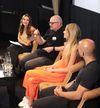In July 2023 AppsFlyer, Batch and Redbox hosted a truly interesting panel event at the Soho Hotel, with guest speakers from Domino’s, Monzo and So Syncd. Under the steer of Sue Azari of AppsFlyer, our panellists spoke to a packed auditorium about how to acquire the most valuable customers and importantly, how to transition them from new users to app advocates.
Our panellists were:
- Jessica Alderson, Co-Founder and CEO of the personality type dating app So Syncd
- Stuart Jones, Head of Digital Products at Domino’s
- Vittorio Boccanera, Senior Growth Manager at Monzo Bank
The session was chaired by Sue Azari, eCommerce Industry Lead at AppsFlyer.
Here, Stuart Jones and Jessica Alderson share a few highlights from that discussion:
Sue: With a lot of change in the market, industries and app ecosystem, what big changes have you seen in UA across the last six months or so?
Jessica: At So Syncd we’ve seen companies be more careful about how they spend their money measure return. Dating is resilient, it’s less cyclical than many industries; there’s less market pressure on dating apps, but capital efficiencies are having an impact.
Stuart: I’m going to be that guy who says AI – it’s not about AI itself, it’s about the confidence that people have in it now, compared to 2 years ago. Suddenly in the marketing department, there’s confidence in machine learning; that’s a big shift.
Sue: How has the journey through Covid and post lockdown and now with the UK looking at recession, impacted your YOY growth targets?
Stuart: We knew that Covid was a growth period, but we also forecast for it settling down again. So, for Domino’s, 2023 has been a relatively normal and consistent year so far, without the impact of Covid or a FIFA World Cup; we’ve moved on from that artificial marketplace now.
Jessica: With no face-to-face dating going on during Covid, apps were the only way you could meet a partner, so that helped us. We launched So Syncd in 2020, so we’re still at an early stage in our evolution and we’ve yet to understand our long-term ‘normal’.

Sue: Is there anything you would recommend in terms of a UA strategy or approach, that you’ve seen success with?
Jessica: A lot of our UA is driven by content we’ve created or by PR. We had great advice from the outset that helped us to build a trusted dating brand without social ads and use PR instead – when you’re helping people to find their life partner, there’s a lot of trust involved.
Stuart: Pinpointing the exact moment in the day when someone is making a decision about food has been key; posing that question internally at Domino’s has meant that we’re not trying to go after everyone all the time.
On the topic of testing, all our panellist agreed that it’s vital. Their shared experience was that gut feel is almost always proved to be wrong when compared with the results from A/B testing. No matter how many years of experience you have, it’s virtually impossible to second guess what will work with different audiences. You just have to keep testing, whether it’s your custom product pages in Apple Search Ads, your app UX development, A/B testing of ad variations or your native content on Tik Tok. Keep testing and learning!

Sue: What does a successful UA campaign look like?
Stuart: Real success is in lifetime value (of the user) and getting your UA to the point of advocacy, not just a short-term spike in sales. For Domino’s the challenge is that people aren’t ordering pizza every day, so we’re always trying to understand what an advocate looks like and spend sensibly towards that, and in ways that we understand the outcome. There must be accountability in how you spend your budget.
Jessica: Lifetime value can be different with dating apps; you do have to grow your user base before you can start monetising, and dating apps don’t typically have high retention rates as people dip in and out, but we do want people to find a partner with us, and people have.
Sue: What’s your definition of an advocate?
Jessica: The best So Syncd advocates are the success stories: a couple who have met via the app. But also, we have users who we think of as ‘pre advocates’; they may not have met anyone yet, but their experience of using the app and its community is positive, and that makes them just as valuable.
Stuart: How we describe a Domino’s advocate today is different to how we might have done so a few years ago. But there are some fundamentals: will you recommend the product; do you think about it first and foremost (before others); were you a decision maker in choosing Domino’s?
Sue: What campaigns, CRM or data strategies do you have in place to nurture your customers?
Jessica: We now have data around thousands of dating success stories, but it’s hard to measure word of mouth - we see organic downloads increasing and we use AppsFlyer to track the source of that download data. Attributing word of mouth is an art, not a science.
Sue: What’s the one thing that people should take away from today?
Stuart: If you look at where Premiership footy teams are doing their pre-season tour this year, none of it makes sense in terms of becoming a better team for next season; they’re playing in the far reaches of the world. This is about creating advocacy and a global user-base. So, no matter what you do, shout louder and wider to build your user base.
Jessica: From a younger company perspective, get as much data as you can, test as much and learn as much as possible and as quickly as possible.

Questions from the audience…
“We’re a relatively young sports related app that needs to grow faster; our users can take 6 months to evolve from new user to subscriber. How might we shorten the sales cycle and quickly grow super-users for our app?”
Stuart: In that 6-month period, offer a free trial of the full app; create the shortest possible trial period you can, and try to create a dependency during that period with insights and useful data for the user.
“You talk a lot about advocacy and shouting wide and loud to your potential advocates, but who are those people?”
Stuart: The shout wide and loud is always to a specific segmentation of people that we know are our clear target audience; we’re shouting loud and wide to them on the platforms where we know they exist.
Jessica: We create a lot of content around personality types rather than dating itself. It’s more sharable and this is key to getting your brand out there without huge budget. For us it’s people in their 20s and it’s an even male/female split.
“I’m interested in the pain-point of downloading the app and how to you persuade someone that it’s better on the app?”
Stuart: Domino’s have a huge campaign to persuade web users that it’s better on the app; it’s a core KPI. If we discount an app order just to transition people from web, we’d better be sure that the app is where we want them to spend their money. Making that transition experience frictionless is challenging; we don’t insist on mandatory login on the app, so maybe we don’t know who you are, so the hard part internally has been to understand that customer journey. If they uninstall the app because of storage, we have to persuade them to download again; we must keep repeating the process.
Jessica: At So Syncd we don’t offer the same depth of functionality on the web as we do on the app; we are very much app-first.
Acquisition to Advocate was a partnership event by Redbox, AppsFlyer and Batch, and was held at the Soho Hotel on 12th July 2023. To register for future Redbox events, please contact us here